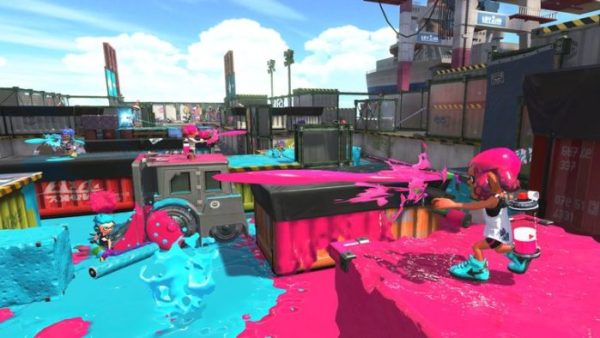Ranked and competitive modes are becoming more and more commonplace in online multiplayer games. These days, it’s easy to pick up any multiplayer game, sink a few hours into it learning the basics, and then be tempted to throw yourself into the thick of things by testing your skill in a more competitive setting. And such is the case for me and Splatoon 2.
On the surface, Splatoon 2 should be an extremely simple game to grasp. The game eases you in slowly with a single-player campaign, and then lets you go online and engage in a few Turf War battles. Turf War itself is a fun little mode that doesn’t necessarily require you to have sick shooting and aiming skills, as the only objective here is to ink more turf than the opposing team. You get to equip a weapon that you like – whether it’s the cheap as all hell Slosher, or the popular Tentatek Splattershot – and just go town on all the deliciously uninked areas, just waiting for you to splash your bubblegum colors all over.
Splatoon 2 appears to be a game intended for younger audiences, where its fan base debates over the most inane of things like mayo and ketchup, and whose fashion is more “fresh.”
However, when you do eventually dip into the ranked matches of Splatoon 2, things become very different. You’re thrown into three new game modes (Rainmaker, Tower Control, Splat Zones), and while the game doesn’t really change mechanically, the stakes are higher because your skill is determined by a rating. Every player starts out at C-. As you win more matches, your rank meter gradually increases, and you’ll reach the next grade when the meter is completely filled. Lose too many matches while you’re in a particular grade, however, and your meter will break, costing you a substantial amount of rank progress.
Since Splatoon 2’s official release on the Switch, my rank has been fluctuating rather wildly between the mid-B and high-C tiers. And in just the past week, I steadily dropped back down to C+ after going on a horrendous losing streak that showed absolutely no signs of stopping. It was one of the most baffling experiences I’d ever had in my gaming life. Out of the 20 games I’d played in one sitting, I had won maybe one or two matches in there.
It was unfathomable. Losing streaks aren’t unheard of in competitive games, but never to the extent I experienced in Splatoon 2. I tried adjusting my own play style, even resorting to using the Slosher to try to carry lower rank games, but it didn’t help much. I even started spending time grinding for Ability Chunks to scrub gear and roll for perks that would be more useful to me. Splatoon players often gush about ‘pure’ gear, which is simply a piece of clothing with all four ability slots dedicated to a single perk.

While I don’t consider myself a very skilled player when it comes to shooter games, I do tend to play them with a rather competitive mindset. Before Splatoon 2 rolled around, I’d sunk hundreds of hours into competitive Overwatch. When LawBreakers dropped earlier this month, I played every quick play match with the ferocious desire to win, even though the competitive mode hadn’t been released yet, and I don’t even have particularly strong feelings for the game. Heck, even with games like ARMS and Hearthstone (both of which I play a lot more casually), engaging in regular battles just isn’t fun. There aren’t any stakes in regular battles. Players take the game much more seriously when their public skill rating is involved, and it creates a very engaging kind of tension within video games that single-player or story-driven titles will never be able to achieve. Competitive modes are what give life to online multiplayer games.
It would be so easy to just give up on trying to get better in ranked Splatoon and just stick to Turf War, but quite frankly, that kind of thinking just doesn’t fly with players who are in it for the competition. The path to perfecting your gear in Splatoon 2 and figuring out which weapons would go best with your equipment sounds like a pretty grindy time with lots of RNG involved, but it’s starting to become a personal mission as I try to figure out exactly what’s wrong with my current build and how I can improve.
Since that devastating losing streak from earlier this week, I’ve dived into the impossibly deep rabbit hole that is competitive Splatoon. From keeping track of online tournaments to scouring Squidboards and other Splatoon-related Discord servers and seeking build advice, I’ve made some critical adjustments to the way I play. Including using the dreaded motion controls, which I’ve loathed since the beginning of the game. I’m not quite back at the mid-B tier I was at previously, but I feel like my gameplay might be starting to improve. I’m starting to know all of the game’s maps like the back of my hand, and I’m a lot more aware of team positioning.
It’s going to be a tough road to B+, which is my current personal goal for competitive Splatoon 2, but improvements are made in slight increments. And as with most competitive games, if you keep practicing, you will eventually get better.
